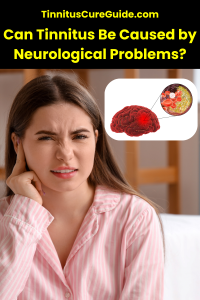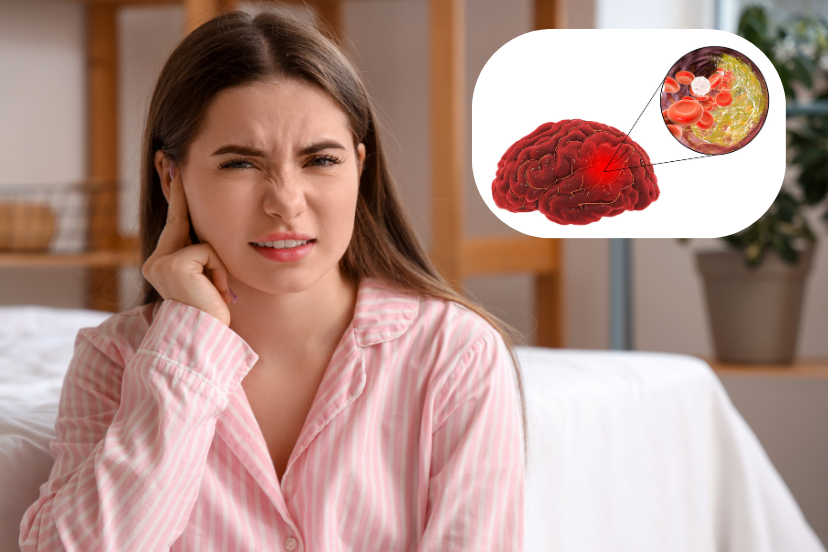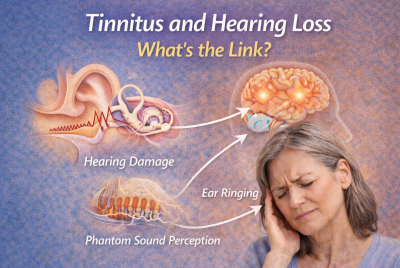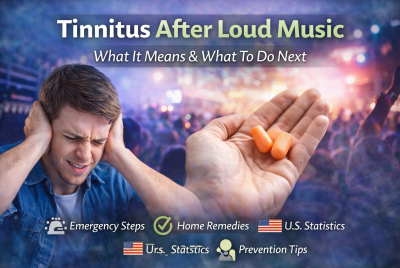Can Tinnitus Be Caused by Neurological Problems? Understanding Tinnitus Neurologic Cause
Do you struggle with ringing in the ears, buzzing, or even a whooshing noise that no one else can hear? For many people, tinnitus is not a minor annoyance — it can disrupt sleep, concentration, and daily peace of mind. While tinnitus is often linked to hearing loss or loud noise exposure, in some cases, the nervous system may play a role.
If you’ve wondered whether a tinnitus neurologic cause could be connected to the brain, nerves, or certain neurological conditions, you’re not alone. In this guide, you’ll learn how neurological factors can influence tinnitus, what patterns may suggest a neurological link, what recovery and evaluation often look like, and what treatment options may help.
Quick Answer
Yes, tinnitus can sometimes be linked to neurological problems because the brain and nervous system are responsible for processing sound signals. Changes in nerve signaling, brain sound processing, or blood flow can contribute to tinnitus symptoms. If tinnitus occurs with neurological symptoms like dizziness, weakness, numbness, or vision changes, a medical evaluation is important.
What Does “Tinnitus Neurologic Cause” Mean?
Tinnitus is often associated with the ear, but the perception of sound is ultimately created by the brain. A tinnitus neurologic cause refers to situations where tinnitus is influenced by:
• Brain sound processing changes
• Nerve pathway irritation or damage
• Neurological conditions affecting auditory circuits
• Vascular or pressure changes that affect nervous system signaling
In these cases, tinnitus may feel like a “phantom sound” created by how the brain interprets signals rather than a sound coming from the outside world.
What This Often Feels Like In Real Life
People who suspect a neurological connection often describe patterns like:
• Tinnitus appearing after a migraine episode
• Ringing beginning after a head injury or whiplash
• Ear noise paired with dizziness or imbalance
• Whooshing or pulsing sounds that feel rhythmic
• Tinnitus that changes with neck position or posture
Some also report tinnitus that feels “different” from typical noise-related tinnitus:
• Sudden onset without clear loud noise exposure
• More noticeable sensory sensitivity during episodes
• Fluctuating symptoms tied to neurological triggers like stress, sleep loss, or migraines
These patterns do not automatically mean a serious cause, but they may justify evaluation if symptoms persist or are paired with other concerns.
Self Check: Does Your Tinnitus Pattern Suggest A Neurological Link?
You may want a medical evaluation for a possible neurologic contribution if you have tinnitus plus:
• Dizziness or balance problems
• New weakness, numbness, or tingling
• Vision changes or visual aura
• Headaches that feel migraine-like
• Tinnitus after head or neck injury
• Pulsing tinnitus matching heartbeat
• Tinnitus mostly in one ear with a new onset
Tinnitus is more commonly ear-related when:
• It follows loud noise exposure
• Hearing loss is present
• It is steady and non-pulsing
• There are no neurological symptoms
Neurological Conditions That May Contribute To Tinnitus
Nerve Damage And Neuropathy
The auditory nerve carries sound information from the inner ear to the brain. If this pathway is irritated or damaged, tinnitus may occur.
Potential contributing situations include:
• Metabolic conditions affecting nerves
• Inflammation or autoimmune issues
• Physical trauma
Multiple Sclerosis (MS)
MS can affect the nervous system’s protective covering, sometimes involving auditory processing pathways. Some people report tinnitus as part of broader symptoms.
Migraines And Neurological Headaches
Migraines can involve sensory processing changes and may be linked to tinnitus, ear pressure, or sound sensitivity.
Cervical Spine And Nerve Compression
Neck and spine issues can influence somatic tinnitus. Some people notice tinnitus changes with posture, head turning, or muscle tension.
Brain Injury Or Stroke
In some cases, brain injury or reduced blood flow can influence sound perception. If tinnitus begins after a neurological event, evaluation is important.
Why The Nervous System Can Create Or Amplify Tinnitus
The brain does not simply “hear” sounds — it interprets signals and fills in gaps. When normal sound input is reduced, or nerve signaling becomes irregular, the brain may increase sensitivity and generate a tinnitus signal.
Common nervous system contributors include:
• Sensory gain increases from reduced input
• Stress hormones increase symptom awareness
• Sleep deprivation reduces filtering ability
• Inflammation raises nervous system sensitivity
This helps explain why tinnitus can feel stronger during stressful periods, illness recovery, migraine episodes, or chronic fatigue.
Typical Pattern: What Improvement Can Look Like Over Time
Tinnitus linked to neurological triggers often follows a pattern of fluctuation rather than a straight line.
Early Stage
• Symptoms may come and go
• Triggers like stress or migraines may intensify perception
Management Stage
• Tinnitus becomes less intrusive with strategies
• Episodes may shorten or become less intense
Long Term Pattern
• Many people learn to reduce distress and improve sleep
• The goal is often improved function and reduced awareness rather than instant silence
Neurological Tinnitus Vs Other Common Tinnitus Causes
Neurological Related Tinnitus
• May occur with dizziness, migraine, and sensory changes
• May fluctuate in episodes
• May follow injury or neurologic symptoms
Hearing Loss Related Tinnitus
• Often steady or constant
• Often paired with measurable hearing loss
• Often worse in silence
Somatic Tinnitus
• Changes with movement, posture, jaw or neck tension
• May improve with physical therapy or muscle work
Pulsatile Tinnitus
• Rhythmic, heartbeat-like
• Often needs medical evaluation
Diagnosis: How Doctors Evaluate Neurological Causes
Evaluation often starts with both hearing and neurological assessment.
Common steps include:
• Medical history and symptom timeline
• Hearing test to check for hearing loss
• Neurological exam for balance, reflexes, coordination
• Imaging when needed to rule out structural or vascular issues
• Blood tests when metabolic or inflammatory causes are suspected
Early evaluation matters most when tinnitus is sudden, unilateral, pulsatile, or paired with neurological symptoms.
Decision Support: When Monitoring Is Reasonable Vs When To Seek Care
When Monitoring At Home May Be Reasonable
• Tinnitus is mild and stable
• No dizziness, weakness, numbness, or vision changes
• Symptoms are slowly improving
• No sudden hearing loss
• No pulsatile pattern
When Medical Evaluation Is Important
• Sudden tinnitus onset
• New hearing loss or ear fullness with tinnitus
• One-sided tinnitus that persists
• Pulsatile tinnitus matching heartbeat
• Dizziness, imbalance, fainting, or neurological symptoms
• Tinnitus after head or neck trauma
Treatment Options for Neurologically Related Tinnitus
Treatment depends on the cause and often focuses on both symptom management and addressing triggers.
Medical Treatments
Potential approaches may include:
• Treating migraines or vestibular issues
• Reviewing medications if tinnitus started after a medication change
• Managing blood pressure and vascular risk factors
• Specialist evaluation for suspected neurological conditions
Some clinics also explore neuromodulation approaches. Availability and effectiveness vary.
Sound Therapy And Technology
• White noise or sound masking
• Sound therapy apps
• Hearing aids with masking features if hearing loss is present
Stress And Nervous System Support
Stress does not “cause” all tinnitus, but it can strongly amplify perception.
Helpful options may include:
• Breathing exercises
• CBT strategies to reduce distress response
• Meditation or mindfulness for sleep support
• Gentle exercise to support circulation
Lifestyle Strategies That Often Help
• Protect hearing from loud noise
• Reduce nicotine exposure
• Moderate caffeine if it worsens symptoms
• Prioritize sleep consistency
• Stay hydrated
Physical Therapy For Cervical Or Somatic Factors
If tinnitus changes with posture or neck tension, a physical therapist may help with:
• Posture correction
• Neck mobility and strengthening
• Muscle trigger point work
• Ergonomic adjustments
Expectation Vs Reality
Expectation:
If tinnitus is neurological, it must be dangerous.
Reality:
Many cases are not emergencies, but certain patterns do require medical evaluation. Even when tinnitus is linked to neurological triggers like migraine, symptom control and coping strategies can significantly reduce daily impact.
Coping Strategies For Daily Life
• Use background sound during quiet work or bedtime
• Build a consistent sleep routine
• Track triggers like stress, migraines, caffeine, or poor sleep
• Use relaxation practices before bed
• Connect with support communities for practical coping ideas
Prevention Tips: Supporting Hearing And Nervous System Health
• Protect ears from loud noise exposure
• Follow safe listening habits with headphones
• Support vascular health with movement and nutrition
• Maintain stable sleep habits
• Manage stress consistently
• Address posture and neck tension if relevant
• Seek care early for sudden symptom changes
FAQs About Tinnitus Neurologic Causes
Can Neurological Disorders Really Cause Tinnitus?
Yes, some neurological conditions or nerve pathway changes can contribute to tinnitus by affecting how sound signals are processed.
How Do I Know If My Tinnitus Is Neurological?
Tinnitus paired with dizziness, numbness, weakness, vision changes, migraines, or sudden onset may suggest a neurological contribution and should be evaluated.
Can Neck Problems Cause Tinnitus?
Yes. Cervical tension and posture issues can influence somatic tinnitus in some people.
Is Neurological Tinnitus Permanent?
Not always. Some cases improve when triggers are treated and coping strategies reduce nervous system sensitivity.
Do Supplements Help Neurological Tinnitus?
Some people explore magnesium or other supplements, but results vary. Always speak with a healthcare provider before starting supplements, especially if you take other medications.
What Is The Best Way To Sleep With Tinnitus?
Background sound, consistent sleep habits, and stress reduction techniques can help reduce nighttime tinnitus awareness.
When Should I See A Doctor For Tinnitus?
Seek medical care for sudden tinnitus, one-sided symptoms, pulsatile tinnitus, hearing loss, dizziness, or neurological symptoms.
Final Takeaway
Tinnitus can sometimes be influenced by neurological factors because sound is processed by the brain and nervous system, not only the ears. Recognizing symptom patterns, identifying triggers, and getting appropriate evaluation when needed can help you make informed next steps.
Many people find that a combination of medical evaluation, sound therapy, stress support, and lifestyle strategies reduces tinnitus impact and improves quality of life.
Disclaimer
This article is for informational purposes only and does not replace professional medical advice. Always consult a licensed healthcare provider for diagnosis and treatment decisions. Seek urgent care if you experience sudden hearing loss, severe dizziness, weakness, numbness, or other concerning neurological symptoms.







